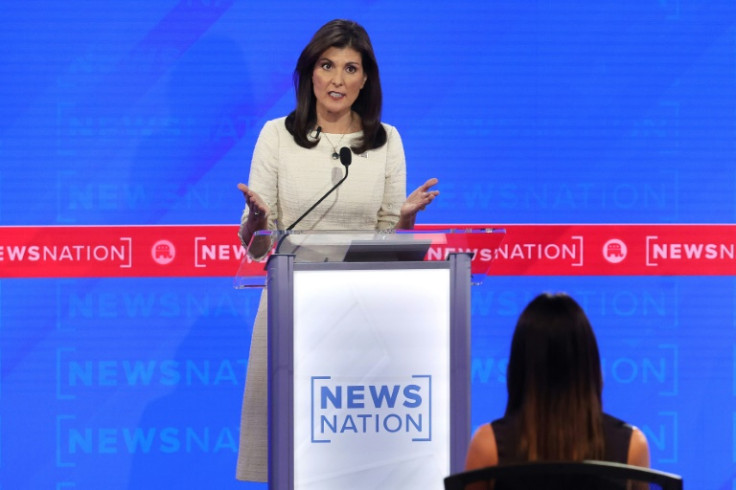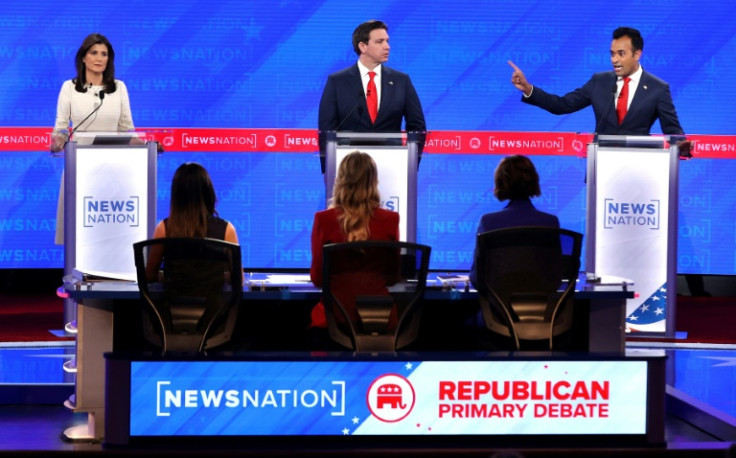
A growing number of US business leaders are rallying behind former South Carolina governor Nikki Haley as the Republican Party's presidential hopeful, seeing her as more stable than rival Donald Trump, and more favorable to business interests than incumbent Joe Biden.
"Even if you're a very liberal Democrat, I urge you: help Nikki Haley too. Get a choice on the Republican side that might be better than Trump," said Jamie Dimon, who as head of JPMorgan Chase bank is often seen as one of the country's most powerful CEOs.
For the last month or so, a growing list of entrepreneurs and business leaders have been lining up behind Trump's former UN ambassador, stumping for her, swelling her campaign coffers or considering doing so as her standing in polls strengthens.
Among them are Charles Koch, one of the biggest donors in US politics, and billionaire investor Stanley Druckenmiller.
In early December, during a fundraiser in a luxury apartment on the Upper West Side of New York, Haley raked in more than $500,000 in pledges from members of the city's business elite.
"I think a lot of donors, including business people, were initially sitting on the sidelines, waiting to see how it would shake out, who could be left standing" after months of campaigning, said David Primo, a political science professor at Rochester University.
As of late October, Haley was polling at less than 10 percent for the Iowa caucuses, the first vote on the US political calendar, on January 15. Now she stands at nearly 18 percent, almost on par with Florida Governor Ron DeSantis, who has around 19 percent.
Haley was "impressive in the debates," said Primo, adding that "business leaders are concerned about the potential instability of another Trump presidency."
"It seems that she will adhere to the guardrails much more than others," said Daniel Kinderman, a professor at the University of Delaware.
"That is something that business leaders, I think, by and large, do appreciate. They do not like it when things get too crazy," he said.
Haley advocates tax cuts, a gradual return to balanced budgets, and raising the minimum retirement age.
"She is committed to fiscal discipline, and fiscal consolidation, and she's concerned about the national debt," said Michael Strain of the American Enterprise Institute. "That's a traditional Republican policy view."
"She has experience as a governor of a state and was viewed as, generally speaking, friendly to business," said Primo.
"She knows how to interact with business leaders," he added.
Trump also wants to cut taxes, particularly corporate tax, but talks very little about deficits and debt. His pledge to extend and raise customs tariffs is of considerable concern in economic circles.
Haley is "not an isolationist, a nativist, or a narrow free-trader," even if she does favor a firmer hand against China, said Jeffrey Sonnenfeld, who teaches business management at Yale and regularly surveys economic leaders.
The 51-year-old is even starting to win over some Democrats, such as investor Reid Hoffman, co-founder of LinkedIn.
"Nikki Haley is a competent politician," he recently told Barron's magazine, adding that she is "an American institutionalist in terms of our democracy and the rule of law."
During the Republican primary debate on Wednesday, one of her rivals, Vivek Ramaswamy, accused Haley of being "corrupt" because of her ties to the business world and in particular her support by Hoffman, whom he referred to as "George Soros Junior."
Others also wonder how her big-business-friendly image might go over with Republican voters.
"Aren't you too tight with the banks and the billionaires to win over the GOP's working-class base, which mostly wants to break the system, not elect someone beholden to it?" moderator Megyn Kelly asked her during the recent debate.
"When it comes to these corporate people that want to suddenly support us, we'll take it," Haley responded. "But I don't ask them what their policies are, they ask me what my policies are."
Beyond Haley's political differences with Trump, "there's concern about President Trump's electability," said Michael Strain.
A recent poll from the Harris Institute gave Haley a better chance against Biden than Trump, who is facing multiple trials in four venues on a host of charges.
"The unusual thing here is to have a candidate 50 points ahead in polls for the primary nomination who is not the strongest candidate in the general election," said Strain.








